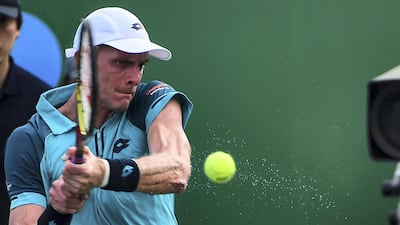An unlikely streak in tennis is expected to go on at next month's Australian Open.
The past five majors, stretching back to the 2016 US Open, have all been won by players over the age of 30.
Andy Murray was 29 years and 56 days old when he won Wimbledon in July 2016, and since then Stan Wawrinka, Roger Federer and Rafael Nadal have won all the grand slam titles having past their milestone 30th birthday.
Given that Nadal, Federer and Novak Djokovic, who himself turned 30 in May as did Murray, are the favourites to win in Melbourne when the action begins on January 15, the chances of a twenty-something getting his name in the winners' club appears slim.
___________________________________________________
Read more:
- Kevin Anderson interview: South African determined to make his mark in Abu Dhabi
- MWTC player profiles: All eyes on Novak Djokovic's return to action
- MWTC 2017 info guide: Players, dates, tickets and all you need to know
___________________________________________________
He is not a grand slam winner himself yet, but Kevin Anderson is a player who has found his best form after turning 30.
The 31-year-old South African reached his first major final in September at the US Open.
His breakthrough moment was achieved by defeating Pablo Carreno Busta in the semi-finals and it is the Spaniard whom Anderson will face in the quarter-finals at the Mubadala World Tennis Championship on Thursday.
When asked as to why he thinks so many players, himself included, are still playing competitive tennis to a high level past the age of 30, and Anderson believes it is partly a change in attitude.
"I think there are a few reasons," the world No 14 said.
"One of them is the perception has changed. I think you just needed one or two guys to push that envelope and play really good tennis and allow people to see that being 30 is no longer that big of a deal. Now it has snowballed and you have a lot of people in their 30s playing some of their best tennis."
Anderson believes the feats of Roger Federer, who won Wimbledon this year just a month before he turned 36, have proven to be an inspiration to other men on the ATP Tour and offered a reminder that age can be just a number.
"I think it does vary from player to player," he said of how each professional handles their career.
"I don’t think Federer is out there because he needs to earn a living. I think he has a passion for the game and that has spread throughout the ranks."
Another factor for Anderson is he believes that players now have a better idea of how to look after themselves on tour then maybe past generations had.
"A lot of guys have their own physios," he said. "Not that people weren’t taking care of their bodies but there is a bigger focus now. A lot of guys feel if they stay healthy that is their biggest challenge."

